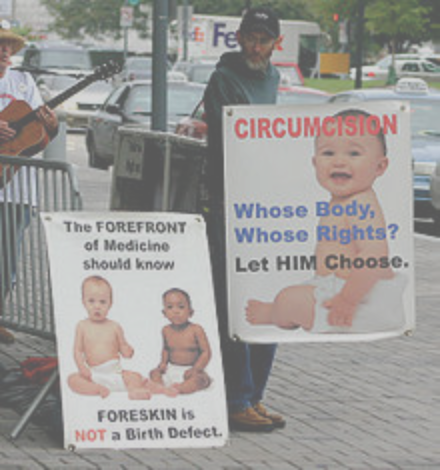The Great Circumcision Debate

To Circumcise or Not… That is the Question
Making the decision to remove a part of your son’s [ahem]… member is a delicate matter for parents. We discussed whether parents choose to circumcise or not on our Facebook page and people got a little crazy (it’s really worth a read, I promise).
Circumcision has increasingly been making headlines — what used to be a no-brainer for many has become a hot-button topic among parents, doctors, and adult men who are upset about being circumcised without consent as babies.
You guys – I always get nasty replies from this email. I fully appreciate what a heated topic it is, but please don’t email me unless you have something tangible to contribute. We should be able to discuss this respectfully without fear of hate mail – thank you!
For the record, I am not advocating either way – my goal here is to present facts and differing points of view.

Background Info
Globally, circumcision is most prevalent in the Muslim world, Israel, Africa, the US, and South Korea. In contrast, it is fairly rare in Europe, Latin America, and most of Asia.
For some, it is dictated by religion. Each year, 100,000 Jewish and 10 million Muslim circumcisions are performed. For others, particularly in America, it tends to be more of a non-religious cultural/family tradition. “Everyone in my family is circumcised, so my son will be too…” – etc.
The Stats
Overall, the total U.S. hospital circumcision rate fell from 64.5 percent in 1979 to 58.3 percent in 2010, a decline of about 10 percent. The decision to circumcise (or not) seems to be most heavily influenced by one’s socio-political-economic group. In the West, only about 30-40% of baby boys are circumcised, while in the Midwest, it’s 70-75% ~ a HUGE difference.

Likewise, Caucasian babies are circumcised more often than African Americans and twice as often as Latinos.
Understanding the social context and history of circumcision in America is useful, and explains a lot, perhaps, about the origins of the custom:
“At the turn of the century, as millions of immigrants from southern and Eastern Europe poured into U.S. cities, circumcision became one way that middle class Americans distinguished themselves from poor immigrants. In his book, Circumcision: A History Of The World’s Most Controversial Surgery, author David Gollaher suggests that it was this meaning of circumcision as a mark of ‘civilization’ that enshrined it in American popular culture (106-107).” (^ sourced from Matthew Tontonoz)
On the other hand, circumcision is generally not a part of non-early-American immigrant/Northern European cultures (for lack of a better word), such as Hispanic, African American and Asian cultures.
Opinions on the matter vary greatly by age too. As described in The Washington Post, “A [2015] YouGov survey found that young people were more skeptical about the practice than their elders: only 33 percent of 18-to-29 year-olds said that male children should be routinely circumcised, compared to 43 percent of 30-to-44 year-olds, 52 percent of 45-to-64 year-olds, and nearly two thirds of seniors.”
Evolution of Circumcision Policy
In 1999, the AAP was fairly ambivalent about circumcision: “Circumcision has potential medical benefits,” the AAP said. It carried advantages as well as risks. Ultimately, the AAP concluded that the existing scientific evidence wasn’t “sufficient to recommend routine neonatal circumcision….”
As a consequence, many insurance companies (Medicaid, namely), stopped covering circumcision, and many anti-circ doctors likened it to cosmetic surgery for the pen!s (I’m trying to avoid being flagged for V!@gra spam, there).
In the years that followed, more studies confirmed (perhaps?) a health benefit of circumcision, namely, the prevention of urinary tract infections (UTIs), penile cancer, and STDs (including syphilis, HIV, herpes, and the human papillomavirus (HPV)). Thus, in 2012, the AAP issued a revised statement reflecting the new information:
“Evaluation of current evidence indicates that the health benefits of newborn male circumcision outweigh the risks…”
Still not a wholehearted endorsement, but they were leaning more in the direction of circumcision.
Other professional medical organizations, like the CDC and the WHO, came out shortly thereafter with similar(ish) pronouncements. The American Urological Association takes a firm middle road, asserting that there are “potential medical advantages and benefits as well as disadvantages and risks.”
The Argument For Circumcision
Urologist Anne-Marie Houle, MD, FRCSC, FAAP, argues:
The 8 best reasons for routine newborn male circumcision:
- decreases the risk of urinary tract infections (UTIs), especially in the first six months
- reduces the risk of heterosexually-acquired HIV infection in men (the WHO points to circumcision as a mechanism to stop the spread of HIV, so that’s worth noting, but in a western, developed country, this is not as compelling as say, sub-Saharan Africa)
- lowers the risk of STDs
- protects against penile cancer (note – this type of cancer is rare in America)
- reduces the risk of penile HPV infection and the risk of cervical cancer in female partners
- prevents chlamydia infections and subsequent pelvic inflammatory disease, ectopic pregnancy, and infertility (in your partner)
- improves sexual function and creativity
The full presentation can be found here.
The Argument Against Circumcision
Still, since 2012, many critics are not convinced, claiming that the studies are flawed and/or likening circumcision to female genital mutilation. There are ethical issues as well: is it fair for parents to make a decision to remove part of a child’s anatomy without his consent?
Dr. Sears, a popular pediatrician, offers the following reasons not to circumcise:
“Are there any reasons NOT to circumcise? Consider these:
- Leave nature alone – whether you believe God created men with a foreskin, or nature simply evolved this way, there must be some reason men have foreskins. Why change something that God/nature has created?
- Sensation and sexual pleasure – the foreskin is filled with nerves, and is therefore extremely sensitive to touch. This enhances sexual pleasure.
- Protects the glans (head) of the penis – the glans is another highly sensitive area. The foreskin protects the glans from constant rubbing and chaffing against clothing that can desensitize it over the years. This preserves sexual pleasure.
- Ethical issues – there are groups of people worldwide, including medical societies, that oppose routine circumcision because they feel it is unethical for a parent to decide to alter the penis of their child without the child’s consent. Parents who are deciding whether or not to circumcise their sons may wish to consider the impact this may have in the future if the child decides they wish they were not circumcised.”
Bottom line: I know many of you are grappling with the decision to circumcise or not. I urge you to think about it, research it, and follow your gut. The “right” decision is the one that you and your family are comfortable with. End of story.
The following articles may help in your decision-making process ~
*I recommend you not only read the articles themselves, but the comments as well. It’s all interesting stuff, both for and against.
- Should You Circumcise Your Baby Boy? – New York Times
- Time for U.S. Parents to Reconsider the Acceptability of Infant Male Circumcision – The Huffington Post
- For a critical bioethical/anthropological perspective, some readers recommend: The Elephant in the Hospital (and for an opposing take on some of the issues in this lecture, see “How Circumcision Broke the Internet,” at Slate.com)
- To Circumcise or Not? The Latest Issue in the Mommy Wars – Care.com
- Facts and Feelings about Circumcision – Parents.com
- Circumcision Guidelines By The AAP Have Been Revised For The First Time Since 1999 – The Huffington Post